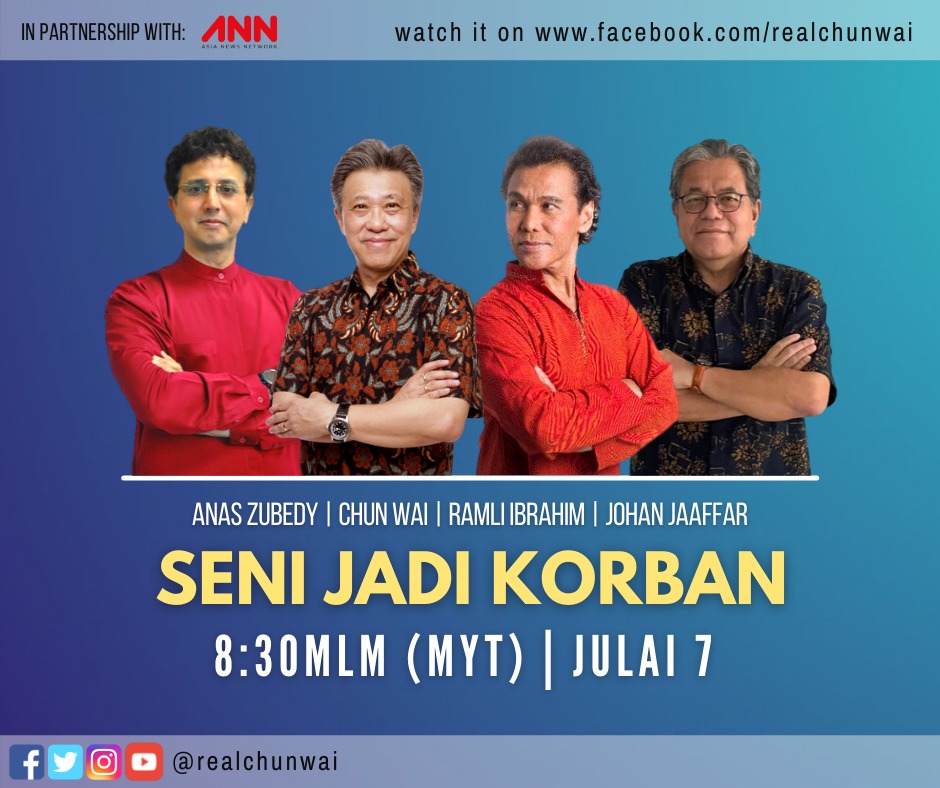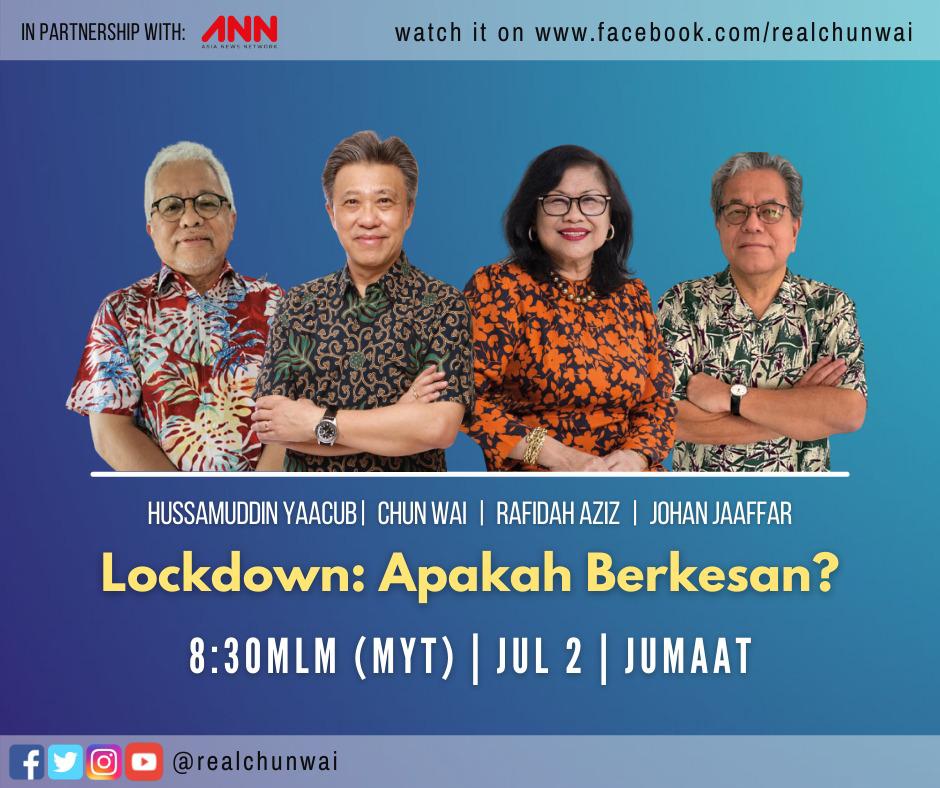

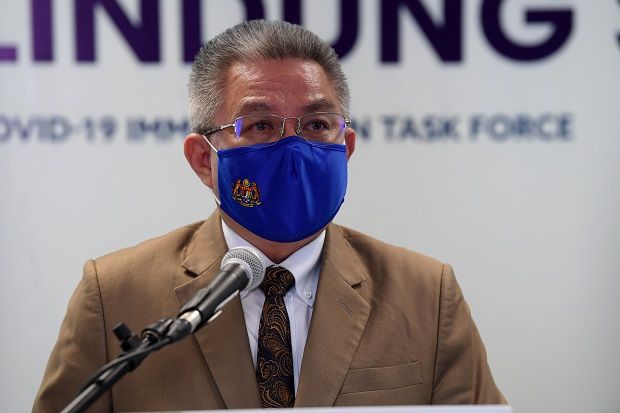
Datuk Seri Dr Adham Baba. -Bernama filepic
IT’S unfortunately a job hazard, and par for the course. Some handle it better than others, but for politicians, they must develop a thick skin.
Health Minister Datuk Seri Dr Adham Baba had a testing week when he became a target on social media following his faux pas during a talk at Universiti Putra Malaysia.
He mistook Spanish Fly, the infamous sexual stimulant, for the Spanish Flu, pointing out how the early 20th century flu pandemic had killed millions of people around the world in two years.
The only problem was that he mentioned the natural aphrodisiac three times before realising (or being told of) his mistake.
But it was already captured in a video that went viral. Soon, he found himself the subject of ridicule and insults, reflecting the overall mood of Malaysians.
He has chosen not to respond to the blunder. Of course, he could have sportingly made light of the issue and taken it all in stride.
The comments on social media shouldn’t be taken seriously. Of course, some have always crossed the line and encroached sedition and racism.
As is probably common knowledge by now, many Malaysians are poor in rational discourse, and this is reflected in the comments section, where we seem to prefer putting opponents down and resorting to name calling, instead of providing sound ideas.
Social media has a life of its own, but it also moves extremely fast. Anyone hosting podcast shows will tell you that the number of viewers keeps dropping the longer it drags.
Our favourite comedian Douglas Lim, who has kept the nation in stitches with his parody of politicians, keeps his videos between four to six minutes, and yet, they are impactful.
So, by this week, we can rest assured that no one will remember what happened to the health minister last week. Malaysians have short memories.
But I’m sure Dr Adham knows the difference between the Spanish Flu and Spanish Fly. The fact that he had spoken to an audience about the deadly virus means he’s informed on the subject.
It’s hard to tell if it was a Freudian slip or deduce what really was on his mind. Perhaps he had been watching too much European football, or something else. I kept saying “lock up” instead of “lock down” during my podcasts, which my friends pointed out to me. I guess my subconscious kept telling my brain that it feels like a lock-up.
But let’s back it up to where it all began. The Spanish Flu – which killed an estimated 20 to 50 million people – didn’t originate from Spain. As a contrast to its deadliness, roughly 17 million people died during the First World War. The pandemic hit the United States, Europe and even remote Pacific islands.
It was mistakenly called Spanish Flu because the Americans and Europeans thought it came from the Iberian Peninsula. What else is new since the Americans have always blamed others for viruses.
The mistake started because Spain, being neutral during WW1, had a free press, so the flu was reported widely, even in gory detail, unlike in the US and Europe where negative news was suppressed to avoid demoralising the allied troops.
The Spanish thought the virus came from France, so they called it French Flu. No one is certain where it came from, although allegations later pointed to a military base in Kansas in 1918, but they remain unproven.
Fast forward to 2021. The world is still debating the origins of the Covid-19 virus. It was detected in Wuhan, China, but that doesn’t mean it came from a military lab in the republic.
But for modern day politicians, they must have learned that social media is more lethal than Covid-19.
No one is spared, really. Prime Minister Tan Sri Muhyiddin Yassin has taken all the crude insults like a sport. He has even acknowledged on public television that he had been called “stupid”, and even when he was ridiculed for hospital admission for diarrhoea, it didn’t seem to upset him, not openly at least.
Tun Dr Mahathir Mohamad appeared on a podcast hosted by comedian Harith Iskander last week.
I can safely say that at least 90% of the comments said nothing positive about him.
I don’t think Dr Mahathir gave two hoots, though. He probably slept well that night. He probably didn’t read the comments, or he has super thick skin because he was still talking about wanting to be the chairman of the National Recovery Plan council.
But this is politics. If politicians can’t take the heat, then they should quit the job and attend to their durian orchards, where it’s likely less prickly.
No one should lodge police reports for insults posted on social media, and in turn, the police shouldn’t entertain such reports.
The Malaysian Communications and Multimedia Commission has rightly said that it’s not investigating alleged insults on Dr Adham over the latter’s gaffe.
Likewise, surely the police have better things to do than to investigate doctors involved in Code Black and Black Monday campaigns, where these government contract medical officers are seeking transparency in the selection for permanent service intake.
Yes, of course they are frustrated, but many are frontliners in the war against Covid-19, so we shouldn’t be pressuring them with unnecessary investigations. Any police probe will only leave an undesired and opposite effect.
It is unnecessary to intimidate the young doctors who are just worried about their future. They have worked hard to be doctors. Leave them alone. In the first place, why did we allow more than 30 medical schools to be set up and overproduce doctors?
There’s also no reason to feel uneasy over Malaysians helping each other. If Malaysians need help, it doesn’t matter where it comes from.
Interestingly, there was even a video purportedly showing a Korean newscaster laughing at the Spanish Fly issue. Except that the newscaster was talking about something else but many of us still shared it, tying it to the recent blooper.
Can we have some common sense please? It’s a rare commodity in our country these days, but shouldn’t we be doing better?
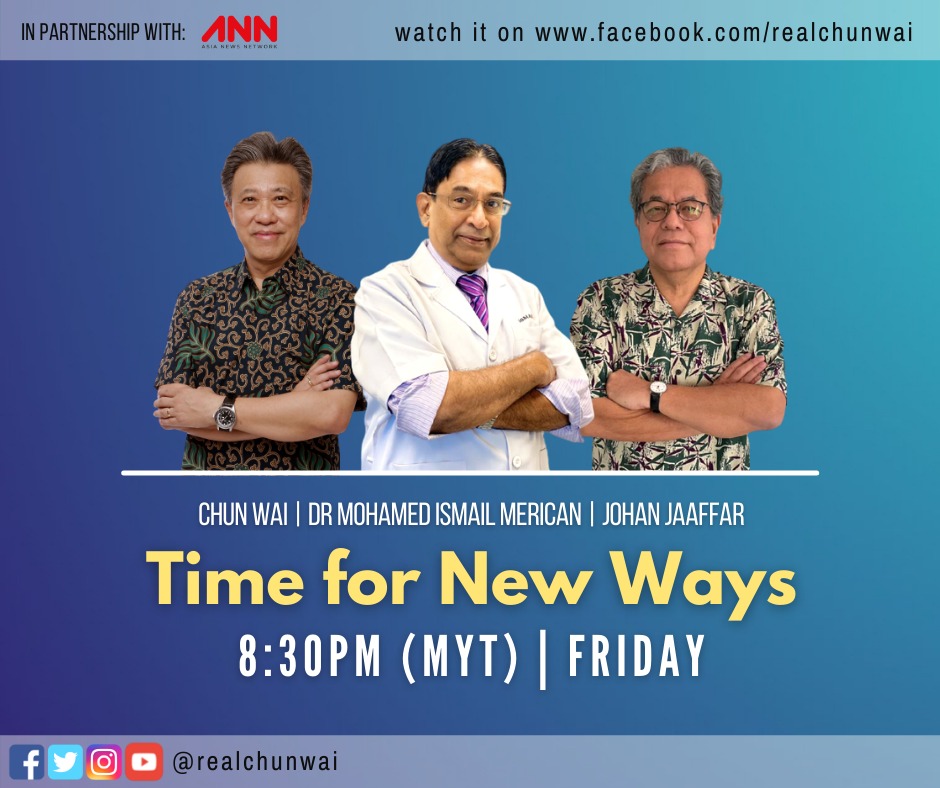

“The design, build and maintenance of the nation’s 5G network managed by Ericsson is estimated to cost RM11bil, around RM700mil lower than the total cost of ownership of the next closest bid,” DNB said in the statement.
MALAYSIANS deserve more answers when a massive billion-dollar contract is awarded to a single vendor for a crucial network infrastructure.
This is, after all, the biggest project that has been given out to the private sector in a long time.
The award has raised many eyebrows but managed to avoid becoming a national controversy because public attention is on the raging Covid-19 pandemic and our plotting politicians.
The short of it is that it is very rare for any telecoms player or government body to pick just one vendor.
But Digital Nasional Bhd (DNB) has awarded Ericsson Malaysia, a Swedish company, with contracts amounting RM11bil to roll out the 5G network in Malaysia.
Aware of the potential controversy, DNB pointed out Ericsson’s bid was RM700mil lower than the next bidder.
But critics argue the whole 5G network development should not be limited to DNB alone, it should not be given all the 5G spectrum for the roll out, and it should also avoid giving out a huge contract to one vendor.
A better way would have been to award the 5G roll-out contract to more than one vendor, and at the same time have a second 5G network run alongside DNB’s. That is the norm globally for even the smallest of countries, to have two players for a 5G roll out.
Then have a spectrum auction instead like other countries such as South Korea, Germany, Thailand and Bangladesh. Opening the market to more players to roll out 5G allows for competition and redundancies, and gives jobs to more than one vendor.
Spectrum auction would be a more effective way to generate income for Malaysia, especially now when our economy is at a critical stage, where Covid-19 has wrecked us.
Yes, it is true that our Malaysian spectrum pricing is much lower than other countries but an auction would still be vital.
There must be good reasons why this is not applied in Malaysia. Unfortunately Malaysians, including the media, have little information despite the huge amount of money involved.
DNB, the government-owned special purpose vehicle, has issued a detailed explanation but there has been little engagement with the media and other stakeholders.
That’s the problem with such a top-down approach – giving the impression that the authorities owe no one an explanation.
In a lengthy statement recently, DNB said the financing of network equipment for the 5G network will be sourced from foreign and domestic financial institutions.
It reiterated Ericsson (Malaysia) Sdn Bhd has undertaken to arrange the financing as part of the agreement to supply, deliver and manage the entire 5G network.
DNB will securitise future cash flow from its wholesale business with mobile network operators, via sukuk programmes to finance its other network operating expenditure and meet its obligations to repay financiers when they become due.
”Accordingly, there will be no government funding required for the 5G network roll-out, “ it said.
DNB announced it had appointed Ericsson to design and build the National 5G Network at a total cost of RM11bil.
DNB further said that the design, build and maintenance of the Malaysian 5G network managed by Ericsson is estimated to cost RM11bil and that is “around RM700mil lower than the total cost of ownership of the next closest bid.”
”Ericsson’s network equipment, deployment services, and ongoing maintenance and network management cost of RM4bil was the lowest.
“The balance of approximately RM7bil will cover network infrastructure costs from other parties comprising primarily tower rental and fibre leasing over a 10-year period, “ it said.
DNB also says that Ericsson’s bid was RM700mil lower than the next bidder. But as The Star pointed out – is the lower cost of RM700mil over a 10-year period that significant as it will only work out to RM70mil a year?
DNB also said its tender process was structured by an independent professional services firm, Ernst & Young Consulting Sdn Bhd (EY Consulting), which it said was done according to global standards and involved four panels, comprising some 50 local and international experts from across 10 countries with current 5G network roll-out experience.
The process began with the initial evaluation of 14 Network Equipment Providers (NEPs), after which, eight were shortlisted and invited to bid for the tender, DNB added.
DNB has said the criteria evaluated when shortlisting the NEPs were:
Of the eight invited, only four submitted their bids, DNB said.
It also noted the tender evaluation team comprised internal and external independent industry experts and experienced professionals, and the tender results were then deliberated extensively by the board tender committee and the board of DNB.
”The strictest standards of governance were adopted throughout the tender process as advised and facilitated by EY Consulting, “ it said.
The tender requirements were based on criteria identified and refined through a rigorous process with industry feedback on the requirements of the 5G network and shared with all invited NEPs, it added.
DNB shared that Ericsson was ranked top in all three key components of the tender evaluation criteria, which were the following:
But the statement has not explained why many other vendors have been left out although they had been operating in Malaysia, employing many Malaysians.
Yes, Ericsson is reputed for its expertise and experience in rolling out 5G in many countries but it has also run into many legal controversies. In fact, far too many, just google.
But to be fair, Singapore has also picked Ericsson over other competitors but it has StarHub too, as a partner. In almost every country, there are always two or three players, and that includes the Philippines, Indonesia and Thailand.
By cutting off the other telco vendors/players in Malaysia, there are bound to be many questions and it would even affect big vendors/players from wanting to put money in Malaysia.
We do not care what the other competitors who have lost out feel as in any tender bid, there will always be winners and losers.
There is always the security issue, why would we want to be dependent on just a foreign vendor, and of course this raises questions about the regulatory framework.
Even the GSMA or Global System Mobile Communications Association, which represents the interest of mobile operators worldwide, uniting over 750 operators with nearly 400 companies, have raised questions over this deal.
GSMA has also highlighted concerns over the surrounding governance of DNB.
But for those following this development, issuing one press statement isn’t good enough when many questions need answers.
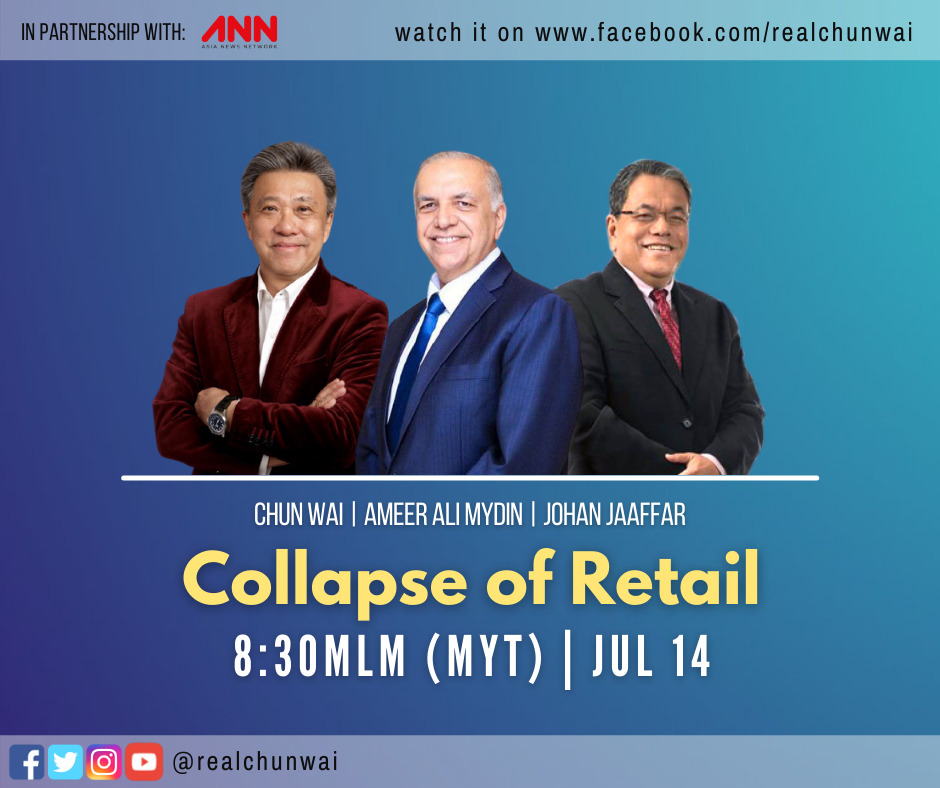

WE’RE in a pickle, aren’t we? A rich one indeed. Public confidence is at rock bottom as our economy withers away under Covid-19, where daily infection rates are spiralling upwards with no end in sight. As a bonus, we have politicians who need reminding that talk is cheap.
The past week has been a testing one. First, the Prime Minister was admitted into hospital for food poisoning.
His office issued a statement to say he was suffering from diarrhoea. The Malay equivalent, cerit berit, gave a more unpleasant image, and soon, Tan Sri Muhyiddin Yassin became a source of crude humour.
The intention of his media officials was good because they wanted to be accountable and upfront, in case his hospitalisation raised any suspicion.
But as the doctors kept him longer for a more thorough check-up, the rumour mill went into overdrive. After all, Muhyiddin is a pancreatic cancer survivor.
With his three-day hospital stay and existing medical conditions, real or otherwise, many of us must surely have wondered about the consequences should the PM be unable to continue with his job.
Not that he’d be declared incapable of performing his duties immediately, but the absence of a deputy prime minister is a frightening proposition.
Even after a year as PM, Muhyiddin still had no deputy, although he had senior ministers. The four were Datuk Seri Ismail Sabri Yaakob, Datuk Seri Azmin Ali, Datuk Fadillah Yusof and Datuk Dr Radzi Mohd Jidin. Now, Datuk Seri Hishammuddin Hussein Onn has been upgraded to a senior minister.
Succession planning is practiced in the corporate world, but scarily, it remained the elephant in the room until Wednesday, when Ismail was assigned to the post of Deputy Prime Minister.
In the private sector, the “hit by a truck” theory simply means if the chief executive officer dies, there will always be someone who can readily take over.
Muhyiddin obviously didn’t have a deputy all this while because he has had a difficult time balancing power among Bersatu, Umno, PAS and the other allies, where positions are a touchy subject.
And to accommodate everyone’s interests, we now have the ludicrous situation of having the most ministers and deputies. Simply embarrassing.
Without a DPM, had Muhyiddin been rendered medically incapable of continuing his job last week, Malaysia would have been plunged into chaos, with instant political turmoil.
The country is currently fragile because the PM has no clear and strong majority in Parliament.
Call it a backdoor government or whatever, but the door was opened because Tun Dr Mahathir Mohamad decided to step down as PM, in a bizarre manner, in February last year, which led to the collapse of the two-year-old Pakatan Harapan government.
Five days later, Muhyiddin succeeded Dr Mahathir, with a new political arrangement in tow.
There is also another theory – that Ismail was appointed DPM to neutralise the Umno supreme council meeting held that same night. It would have been difficult for Datuk Seri Ahmad Zahid Hamidi to push his plan through to withdraw from the government.
In the end, the explosive situation was reduced to just the withdrawal of backing for the PM. But Umno Members of Parliament were left to decide on their own.
In a strange twist, the Umno supreme council meeting started with Ahmad Zahid congratulating Ismail, and then went on to what Umno should do with the existing government.
As the meeting dragged past midnight, the tired media wrongly reported that Umno had pulled out of the Muhyiddin administration.
So the prospect of political drama all came to naught, for now anyway. The Umno supreme council also issued contradicting statements on whether the decision was unanimous.
Umno MPs, particularly those holding federal posts, either bit their lip or agreed to carry on with their work.
So it looks like Ahmad Zahid didn’t only fail to execute the 14-day deadline ultimatum of getting Parliament to convene but also bungled in getting Umno completely cut off from the government.
He also didn’t manage to collect the statutory declarations of Umno MPs to ensure they had taken a common stand. Not that these SDs are worth more than the paper they’re written on, but at least there would have been some form of credibility to the claim.
The appointments of Ismail and Hishammuddin have not fired up the imagination of ordinary Malaysians, who are more concerned about keeping their jobs or looking for one, and putting food on the table.
Without mincing words, we’re aghast at the level of politicking in our beloved Malaysia, done against the backdrop of a dwindling economy.
After more than a year, we have bafflingly taken a few steps back in the fight against the Covid-19 pandemic. By now, we should have planned the economy’s reopening, but instead, we’re down in the doldrums.
All the lockdowns have failed miserably, and yet, we’re still sticking to strategies that flop.
When Parliament convenes on July 26, will we see quality ideas and debates from our lawmakers on how they can collectively take us out of this sorry situation? Or will we only see vacuous rhetoric and theatrics over the command of the PM’s majority?
The unhappiness on the ground is seismic but we definitely can’t have a general election where the PM can prove he has the mandate of the people.
Do we trust politicians who tell us it’s safe to have a general election? Why should we risk our health just to help these selfish MPs fulfil their ambitions?
We’re bound by common objectives – keeping Covid-19 at bay by speeding up vaccinations, conducting mass tests, and having fool-proof strategies which allow businesses to stay afloat.
By now it’s clear that we must do what we can to help each other as a nation regardless of race, religion or culture.
It hurt when a Bloomberg columnist opined that Malaysia is close to becoming a failed state, but we must spot that light at the end of the tunnel. I believe in Malaysia and Malaysians. We must, for our sake.
As my friend Anas Zubedy said, Malaysians rallying to help each other is not the behaviour and precondition of a failed state, but instead, a state ready to do what it takes to get back in the saddle and get better.
All Malaysians are in the same boat, so let’s save ourselves from Covid-19 and politicians.
#KitaJagaKita.
IT SMACKS of discrimination, really. The European Union (EU) has now reportedly said that its approval of AstraZeneca doses made by South Korea, Thailand, India or Japan would not be recognised.
Unfortunately, South Korea and Thailand produce AstraZeneca (AZ) vaccines for Malaysia’s order.
That means Malaysians vaccinated with AZ may be barred from entering Europe. The European Union’s Digital Covid Certificate will only recognise EU-approved shots for free travel within the bloc.
The European Medicines Agency (EMA) has approved the Covid-19 vaccine by AstraZeneca (branded Vaxzevria), besides Pfizer-BioNTech, Moderna, and Johnson & Johnson.
But the EU drug regulator’s approval does not cover AstraZeneca doses made by South Korea’s SK Bioscience or Thailand’s Siam Bioscience.
The EMA has only approved AZ vaccine manufacturing sites in the EU, the United Kingdom, United States and China.
But while South Korea’s SK Bioscience manufacturing site is listed in Vaxzevria’s product information as one of the manufacturers of the vaccine’s biological active substance, EMA said this simply means that “the active substance produced at this site can be used to manufacture Vaxzevria, the vaccine that is authorised in the EU”.
The EU is saying this – the AZ produced in South Korea or Japan is not good enough.
It has accepted the one that is Made-In-China because no one messes around China. It is also a moot point as most Chinese have been vaccinated with Sinovac rather than AZ.
Until now, the EU is dragging its feet over the status of Sinovac, presumably counting the economic impact on Europe if the Chinese stop coming into Europe or start a boycott. The fact is China is the EU’s biggest trading partner.
These Europeans cannot make up their mind; it’s that simple. They are much smarter than the Aussies, which has taken China to the World Trade Organisation (WTO) for the high tariffs on the wine.
Who is advising the Australian Prime Minister on this? You have kicked and humiliated the Chinese, and you expect them to buy your wine.
Instead of calming them down, you take them to the WTO. How brilliant. What a great way to treat your customers.
Perhaps Asians should tell the EU that we should not buy their luxury cars such as the Mercedes-Benz, which are assembled in India, Malaysia and Thailand – because they are not made in Europe.
It may not be the best comparison as it is like comparing apples and oranges, or well, durians and rambutans.
But is that the logic because if these German cars are assembled in Asia, their quality would not match those in Europe?
The French Peugeot owns and operates in Malaysia. It is also assembled in Vietnam and is starting manufacturing in India. I like to think these are good cars regardless of where they are assembled or manufactured because there will be proper quality control to protect the brands.
We know that Korean cars are produced in Czechoslovakia for Europe while Germany’s BMW cars are assembled in Malaysia.
All these decisions to recognise or not to recognise certain vaccines have put the world in a fix.
The EU has snubbed the World Health Organisation who has listed two versions of the AstraZeneca/Oxford Covid-19 vaccine for emergency use, giving the green light for these vaccines to be rolled out globally through Covax.
WHO’s Emergency Use Listing (EUL) assesses the quality, safety and efficacy of Covid-19 vaccines and is a prerequisite for Covax Facility vaccine supply.
It also allows countries to expedite their regulatory approval to import and administer Covid-19 vaccines.
But the Europeans are not the only ones giving the world this predicament. This includes the Chinese, too. If you are not vaccinated by Sinovac or Sinopharm, the two Chinese vaccines, you may be barred from entering China.
For many businessmen in Malaysia, who need to travel to China, their preferences are the Sinovac. But it’s beyond their control because they cannot select the vaccine that they preferred.
We should also not assume that everyone is embracing the American vaccine because there are many Asians who have walked away from vaccination centres when they find out that they would be given Pfizer.
They would rather take the Sinovac than Pfizer, Moderna or AZ, which would be the choice of those wanting to go to the US or UK. We are not even sure of the status of AZ vaccinated people who want to enter the US.
There are reports that the US does not recognise AZ and is reportedly sending them abroad, presumably because its regulatory system has not approved it yet.
For Muslims in Malaysia, the Saudi Arabia government has insisted that it would only allow pilgrims jabbed with Pfizer and AZ. That must be heartbreaking for many pilgrims – who are vaccinated with other vaccines – from many countries.
Then, there is the Taiwan government which refused to accept Chinese vaccines out of pride.
They accepted the AZ vaccine, which included over two million doses from Japan, and now we are told the EU doesn’t recognise the Japanese one either.
As of now, the vaccines, regardless of their brands, are about saving lives. The last thing that we are worried about is making overseas trips, unless on urgent business.
We will let the leaders sort out this mess. It will be foolish if vaccine discrimination comes into effect.
No one would want to admit it’s just a way of keeping away certain nationalities, but it looks to be that way.
Note: I have had my second dose of #CucukMYAZ and I am grateful. I don’t have the slightest worry if I am unwelcomed anywhere else.
